Most Iconic and Most Successful Cycling Team of All Time
- Accessories
- Team History
- Historic Videos
- Brand History


1976: Red Tidal Wave: Domination

Freddy Maertens’ name is inseparable from the Flandria legend. Maertens stayed at Flandria for most of his career, during which time he became the greatest winning machine cycling has ever seen. He was at his peak in 1976 where he won Flandria’s second professional road race title, and he also took a record-equalling 8 stages of the Tour de France, which also gave him the Green points jersey. Maertens wore the leader’s Yellow jersey for half of the 1976 Tour. His tally of victories in 1976 was an astonishing 54, the most victories ever by a professional in a single season, tied with Eddy Merckx’s 1971 total.
Pollentier also continued to develop, and when he, Maertens and Demeyer were at their best in 1977, winning became almost routine. Flandria bikes racked up their greatest haul of victories in a single season - 103. 1977 was notable for another reason. Flandria offered a pro contract to the young Irishman Sean Kelly, who began an apprenticeship under Freddy Maertens, which was effectively a kind of sprinting masterclass.
In the 1977 Tour of Spain the Flandria team obliterated the opposition. Maertens won the prologue and led from start to finish, winning an unprecedented 13 stages, the overall classification and the points jersey. 14 out of the 20 stages were won by Flandria, with Pollentier taking the other stage win.

As the red tidal wave swept into Italy for the Giro d’Italia, Flandria’s dominance continued. Once again Maertens won the prologue and took the leader’s pink jersey, which Flandria defended until stage 5 when it was taken by the Italian Francesco Moser. By the time the race sped into Mugello, Maertens had already won 7 stages, was expected to take win number 8 and regain the pink jersey in the following day’s time trial, where he was the favourite to win. The run-in began as usual, with Pollentier taking the lead and Demeyer right behind, ready to take Maertens into the final kilometre, where he would power past for the win. However, in the sprint, Maertens was elbowed and crashed horrifically. Unconscious and bleeding, he was rushed to hospital where his wounds were stitched and his broken wrist was put in a cast. The following morning he was in so much pain that he was unable to start the day’s stage. Such was the solidarity of the Flandria team that the whole squad voted to quit the race and go home to Belgium. Maertens managed to convince them, however, that they should continue in his absence. Now on a crusade, the team’s determination was even greater. Demeyer won two more stages and Pollentier outclimbed Moser in the Dolomites, taking back the leader’s jersey and holding on to it until the end of the race to claim the overall victory.
By now, Flandria had won every race on the calendar except for Milan-San Remo and the Tour de France, and in 1978 that elusive Tour win became their number-one focus. Maertens was not a good enough climber to be a yellow jersey candidate, so the team’s overall strategy depended on Pollentier performing well in the mountains. Pollentier had shown he was in-form having just won the Dauphiné Liberé. If Pollentier could take the yellow jersey in the Tour, Maertens the Green points jersey, and Demeyer stage victories, Flandria would make an indelible mark on the Tour’s history books.
Initially, the plan worked to perfection. Maertens won two early stages and had a firm grip on the green jersey, Pollentier had the climbers’ polka dot jersey, and even Sean Kelly had won a stage in what was his first Tour de France. On the crucial stage to Alpe d’Huez, Pollentier broke clear of the pack and soloed to victory on the murderous ascent, increasing his advantage over his rivals and claiming the yellow jersey. Flandria now owned all three principle jerseys in the Tour: yellow, green and polka dot, and it seemed that they would surely hold onto them until Paris, which was now only 6 days away.
What subsequently transpired, however, did not go according to plan. Pollentier, exhausted and suffering from extreme dehydration after the climb to Alpe d’Huez, was unable to provide a urine sample at the doping control. Failure to provide a sample is treated as equivalent to a positive drugs test and Pollentier was controversially excluded from the race. Maertens, however, retained his green points jersey all the way to the Champs Elyseés and Demeyer took a further stage victory, while the Portuguese rider Joaquim Agostinho ensured Flandria still made the podium in Paris, taking third overall.
Flandria’s final season in 1979 saw the team again miss out on overall victory in the Tour de France, with Joaquim Agostinho again taking third.
1976 Tour de France
63rd edition: june 24 - july 18, 1976, results, stages with running gc, history and photographs.
1975 Tour | 1977 Tour | Quick Facts | Tour de France database | 1976 Tour GC | Stage results with running GC | The Story of the 1976 Tour de France

Map of the 1976 Tour de France
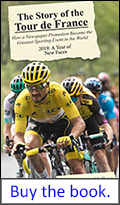
Bill & Carol McGann's book The Story of the Tour de France, 2019: A Year of New Faces is available as an audiobook here .
1976 Tour Quick Facts:
The 1976 Tour de France was 4,016 km long and raced at an average speed of 34.514 km.
There were 130 starters and 87 classified finishers.
Eddy Merckx did not participate.
Climbing specialist Lucien van Impe recognized that the particularly hilly nature of the 1976 edition was a rare opportunity to try to win the General Classification rather than the climbers' title.
Van Impe's success is generally attributed in no small part to the tactical assistance given to him by his director, Cyrille Guimard.
Freddy Maertens ' 8 stage wins in a single Tour tied Charles Pélissier's and Eddy Merckx's record.
1976 Tour de France complete final General Classification:
- Joop Zoetemelk (Gan-Mercier) @ 4min 14sec
- Raymond Poulidor (Gan-Mercier) @ 12min 8sec
- Raymond Delisle (Peugeot-Esso) @ 12min 17sec
- Walter Riccomi (SCIC-Fiat) @ 12min 39sec
- Francisco Galdos (KAS) @ 14min 50sec
- Michel Pollentier (Velda-Flandria) @ 14min 59sec
- Freddy Maertens (Velda-Flandria) @ 16min 6sec
- Fausto Bertoglio (Jolliceramica) @ 16min 36sec
- Vicente López-Carril (KAS) @ 19min 28sec
- José Pesarrondona (KAS) @ 21min 14sec
- José Martins (KAS) @ 21min 45sec
- Wladimiro Panizza (SCIC-Fiat) @ 22min 8sec
- Luis Ocaña (Super Ser) @ 25min 8sec
- Raymond Martin (Gitane-Campagnolo) @ 25min 35sec
- Giancarlo Bellini (Brooklyn) @ 26min 43sec
- Pedro Torres (Super Ser) @ 32min 44sec
- Ronny De Witte (Brooklyn) @ 34min 21sec
- Ferdinand Julien (Lejeune-BP) @ 36min 29sec
- Robert Bouloux (Jobo-La France) @ 39min 54sec
- Georges Talbourdet (Gan-Mercier) @ 41min 35sec
- Jean-Pierre Danguillaume (Peugeot-Esso) @ 41min 42sec
- Enrique Martinez (KAS) @ 44min 50sec
- Alain Meslet (Gitane-Campagnolo) @ 46min 20sec
- Antonio Martos (KAS) @ 47min 42sec
- Bert Pronk (TI-Raleigh) @ 48min 39sec
- Antonio Menendez (KAS) @ 49min 13sec
- Régis Ovion (Peugeot-Esso) @ 52min 36sec
- Christian Seznec (Gan-Mercier) @ 53min 52sec
- Bernard Bourreau (Peugeot-Esso) @ 54min 53sec
- José-Luis Viejo (Super Ser) @ 55min 16sec
- Donato Giuliani (Jolliceramica) @ 58min 40sec
- Hubert Mathis (Miko-De Gribaldy-Superia) @ 1hr 0min 3sec
- Miguel Maria Lasa (SCIC-Fiat) @ 1hr 0min 49sec
- Roger Legeay (Leujeune-BP) @ 1hr 1min 59sec
- Attilio Rota (SCIC-Fiat) @ 1hr 3min 11sec
- Luciano Conati (SCIC-Fiat) @ 1hr 4min 48sec
- Marcello Bergamo (Jolliceramica) @ 1hr 4min 50sec
- André Romero (Jobo-La France) @ 1hr 7min 37sec
- Michel Perin (Gan-Mercier) @ 1hr 8min 30sec
- Bernard Labourdette (Jobo-La France) @ 1hr 12min 6sec
- Mariano Martinez (Lejeune-BP) @ 1hr 25min 34sec
- Jean-Pierre Genet (Gan-Mercier) @ 1hr 26min 39sec
- Arnaldo Caverzasi (SCIC-Fiat) @ 1hr 27min 33sec
- Yves Hézard (Gan-Mercier) @ 1hr 29min 34sec
- Michel Le Denmat (Lejeune-BP) @ 1hr 29min 45sec
- Guy Sibille (Peugeot-BP) @ 1hr 31min 27sec
- Maurice Le Guilloux (Gan-Mercier) @ 1hr 33min 23sec
- Robert Mintkiewicz (Gitane-Campagnolo) @ 1hr 34min 11sec
- Enrico Paolini (SCIC-Fiat) @ 1hr 37min 14sec
- Ivan Schmid (Velda-Flandria) @ 1hr 40min 52sec
- Carlos Melero (KAS) @ 1hr 46min 19sec
- Hubert Arbes (Gitane-Campagnolo) @ 1hr 46min 58sec
- Herman Van Der Slagmolen (Brooklyn) @ 1hr 52min 48sec
- Celestino Vercelli (SCIC-Fiat) @ 1hr 56min 16sec
- Marc Demeyer (Velda-Flandria) @ 1hr 58min 53sec
- Albert Van Vlierberghe (Velda-Flandria) @ 1hr 59min 18sec
- Charles Rouxel (Peugeot-Esso) @ 1hr 59min 26sec
- Alessio Antonini (Jolliceramica) @ 1hr 59min 42sec
- Sylvain Vasseur (Gitane-Campagnolo) @ 2hr 1min 47sec
- Patrick Beon (Peugeot-Esso) @ 2hr 3min 56sec
- Herman Beysens (Velda-Flandria) @ 2hr 5min 4sec
- Pierino Gavazzi (Jolliceramica) @ 2hr 5min 5sec
- Knut Knudsen (Jolliceramica) @ 2hr 5min 33sec
- André Chalmel (Gitance-Campagnolo) 2 2hr 8min 49sec
- Marcello Osler (Brooklyn) @ 2hr 9min 53sec
- Willy Teirlinck (Gitane-Campagnolo) @ 2hr 12min 37sec
- Santiago Lazcano (Super Ser) @ 2hr 13min 24sec
- Paul Wellens (Miko-De Gribaldy-Superia) @ 2hr 14min 11sec
- Joel Hauvieux (Lejeune-BP) @ 2hr 14min 25sec
- Domingo Perurena (KAS) @ 2hr 14min 43sec
- Roland Berland (Super Ser) @ 2hr 14min 50sec
- Regis Delepine (Gan-Mercier) @ 2hr 15min 22sec
- René Dillen (Gitane-Campagnolo) @ 2hr 16min 13sec
- Guy Maingon (Jobo-La France) @ 2hr 17min 28sec
- Gerard Vianen (Gan-Mercier) @ 2hr 20min 22sec
- Ferdinand Bracke (Lejeune-BP) @ 2hr 21min 24sec
- Adriano Passuello (Brooklyn) @ 2hr 28min 46sec
- José De Cauwer (TI-Raleigh) @ 2hr 29min 52sec
- Jacques Esclassan (Peugeot-BP) @ 2hr 30min 13sec
- Roland Smet (Lejeune-BP) @ 2hr 31min 9sec
- Roger Loysch (Miko-De Gribaldy-Superia) @ 2hr 32min 25sec
- Jan Raas (TI-Raleigh) @ 2hr 39min 41sec
- Gerben Karstens (TI-Raleigh) @ 2hr 44min 27sec
- Eric Lalouette (Lejeune-BP) @ 2hr 50min 3sec
- José Luis Uribezubia (Super Ser) @ 3hr 10min 5sec
- Aad Van Den Hoek (TI-Raleigh) @ 3hr 12min 54sec
Climbers' Competition:
- Giancarlo Bellini (Brooklyn): 170 points
- Lucien van Impe (Gitane-Campagnolo): 169
- Joop Zoetemelk (Gan-Mercier): 119
- Francisco Galdos (KAS): 81
- Raymond Poulidor (Gan-Mercier): 81
- Pedro Torres (Super ser): 65
- Raymond Delisle (Peugeot-Esso): 63
- Antonio Menendez (KAS): 59
- Luciano Conati (SCIC-Fiat): 56
- Walter Riccomi (SCIC-Fiat): 49
Points Competition:
- Freddy Maertens (Velda-Flandria): 293 points
- Piero Gavazzi (Jolliceramica): 140
- Jacques Esclassan (Peugeot-Esso): 128
- Enrico Paolini (SCIC-Fiat): 122
- Gerben Karstens (TI-Raleigh): 109
- Michel Pollentier (Velda-Flandria): 92
- Régis Delépine (Gan-Mercier): 80
- Joop Zoetemelk (Gan Mercier): 78
- Lucien van Impe (Gitane-Campagnolo): 74
- Wladimiro Panizza (SCIC-Fiat): 74
Team Classification:
- KAS: 350hr 5min 39sec
- Gan-Mercier @ 9min 20sec
- SCIC-Fiat @ 28min 2sec
- Peugeot-Esso @ 30min 49sec
- Gitane-Campagnolo @ 40min 3sec

Content continues below the ads
Stage Results with Running GC:
Prologue: Thursday, June 24, St. Jean de Monts 8 km Individual Time Trial
- Freddy Maertens: 11min 3sec
- Jesus Manzaneque @ 17sec
- Bernard Thévenet @ 20sec
- Bert Pronk s.t.
- Gerrie Knetemann @ 21sec
- Michel Pollentier s.t.
- Joop Zoetemelk @ 22sec
- Raymond Poulidor @ 27sec
- Giancarlo Bellini @ 28sec
- Yves Hézard s.t.
- Luis Ocaña s.t.
GC after prologue: Same placings and times as prologue
Stage 1: Friday, June 25, St. Jean de Monts - Angers, 173 km
- Freddy Maertens: 4hr 43min 37sec
- Régis Delépine s.t.
- Ercole Gualazzini s.t.
- Gerben Karstens s.t.
- Jan Van Katwijk s.t.
- Jacques Escalssan s.t.
- Piero Gavazzi s.t.
- Piet Van Katwijk s.t.
- Robert Mintkiewicz s.t.
- Luciano Borgognoni s.t.
GC after Stage 1:
- Freddy Maertens: 4hr 54min 40sec
- Michel Pollentier @ 21sec
- Luis Ocaña @ 28sec
- Giancarlo Bellini s.t.
Stage 2: Saturday, June 26, Angers - Caen, 236.5 km
- Giovanni Battaglin: 6hr 43min 49sec
- Piero Gavazzi @ 10sec
- Jan Raas s.t.
- Freddy Maertens s.t.
GC after Stage 2:
- Freddy Maertens: 11hr 38min 39sec
Stage 3: Sunday, June 27, Le Touquet Paris Plage 37 km individual time trial
To save you some Google time, "Le Touquet Paris Plage" is a French beach resort on the English Channel.
- Freddy Maertens: 47min 8sec
- Michel Pollentier @ 1min 37sec
- Ruy Schuiten @ 2min 1sec
- Jesus Manzaneque @ 2min 12sec
- Ferdi Bracke @ 2min 23sec
- Bert Pronk @ 2min 28sec
- Jean-Pierre Danguillaume @ 2min 39sec
- Ronny De Witte @ 2min 41sec
- Hennie Kuiper @ 2mn 57sec
- Raymond Poulidor @ 2min 58sec
GC after Stage 3:
- Freddy Maertens: 12hr 25min 47sec
- Michel Pollentier @ 1min 58sec
- Jesus Manzaneque @ 2min 29sec
- Roy Schuiten @ 2min 32sec
- Bert Pronk @ 2min 46sec
- Ferdi Bracke @ 2min 55sec
- Raymond Poulidor @ 3min 25sec
- Jean-Pierre Danguillaume @ 3min 26sec
- Yves Hézard @ 3min 30sec
- Hennie Kuiper @ 3min 34sec
Stage 4: Monday, June 28, Le Touquet Paris Plage - Bornem, 258 km
- Hennie Kuiper: 7hr 31min 25sec
- Eric Loder s.t.
- Piero Gavazzi @ 9sec
- Guy Sibille s.t.
- Gérard Vianen s.t.
- Jan Raas @ 11sec
- Wladimiro Panizza s.t.
- Freddy Maertens @ 14sec
- Jacques Esclassan s.t.
GC after Stage 4:
- Freddy Maertens: 19hr 57min 26sec
- Hennie Kuiper @ 3min 20sec
Stage 5A: Tuesday, June 29, Louvain 4.3 km Team Time Trial.
The teams were racing for individual time bonifications awarded to the three best teams: 10sec, 6sec, 3sec.
- TI-Raleigh: 26min 49.5sec
- Flandira-Velda @ 5sec
- Peugeot-Esso @ 20sec
- Gan-Mercier @ 28sec
- SCIC-Fiat @ 32sec
- Jolliceramica @ 52sec
- Lejeune-BP @ 55sec
- Brooklyn @ 59sec
- KAS-Campagnolo @ 1min 17sec
- Gitane-Campagnolo @ 1min 25sec
- Super Ser @ 1min 36sec
- Miko-De Gribaldy @ 2min 12sec
- Jobo-Wolber @ 3min 59sec
GC after Stage 5A:
- Freddy Maertens: 19hr 57min 20sec
- Michel Pollentier @ 2min 4sec
- Jesus Manzaneque @ 2min 35sec
- Roy Schuiten @ 2min 38sec
- Bert Pronk @ 2min 42sec
- Ferdi Bracke @ 3min 1sec
- Hennie Kuiper @ 3min 15sec
- Jean-Pierre Danguillaume @ 3min 29sec
- Raymond Poulidor @ 3min 31sec
- Yves Hézard @ 3min 36sec
Stage 5B: Tuesday, June 29, Louvain - Verviers, 144 km
- Miguel-Maria Lasa: 3hr 51min 17sec
- Michel Périn @ 8sec
- Antonio Martos s.t.
- Patrick Béon s.t.
- Freddy Maertens @ 33sec
- Ronny De Witte s.t.
- Hennie Kuiper s.t.
- Mariano Martinez s.t.
GC after Stage 5B:
- Freddy Maertens: 23hr 49min 10sec
- Hennie Kuiper @ 3min 16sec
- Jesus Manzaneque @ 3min 25sec
- Roy Schuiten @ 3min 28sec
- Bert Pronk @ 3min 32sec
- Ronny De Witte @ 3min 45sec
- Giancarlo Bellini @ 3min 48sec
Stage 6: Wednesday, June 30, Bastogne - Nancy, 209 km
- Aldo Parecchini: 5hr 22min 32sec
- Enrico Paolini @ 4min 29sec
- Gerrie Knetemann s.t.
- Mariano Martinez @ 4min 31sec
- Georges Talbourdet s.t.
- Raymond Delisle s.t.
- José-Luis Viejo @ 4min 38sec
- Antonio Menendez @ 4min 41sec
- Giambattista Baronchelli s.t.
GC after Stage 6:
- Freddy Maertens: 29hr 16min 23sec
Stage 7: Thursday, July 1, Bastogne - Mulhouse, 205.5 km
- Freddy Maertens: 5hr 41min 12sec
- Michel Le Denmat s.t.
- Walter Riccomi s.t.
- Raymond Poulidor s.t.
- Michel Périn (5hr 41min 5sec, times taken when riders entered the velodrome)
- Maurice Le Guilloux s.t.
GC after Stage 7:
- Freddy Maertens: 34hr 57min 35sec
- Jean-Pierre Danguillaume @ 3min 23sec
- Giambattista Baronchelli @ 3min 51sec
- Lucien van Impe @ 3min 54sec
Stage 8: Friday, July 2, Valentigney - Divonne les Baines, 220.5 km
- Jacques Esclassan: 5hr 54min 11sec
- Enrico Paolini s.t.
- Miguel-Maria Lasa s.t.
- Herman Van Der Slagmolen s.t.
GC after Stage 8:
- Freddy Maertens: 40hr 51min 45sec
Stage 9: Sunday, July 4, Divonne les Bains - L'Alpe d'Huez , 258 km
- Joop Zoetemelk: 8hr 31min 49sec
- Lucien van Impe @ 3sec
- Francisco Galdos @ 58sec
- André Romero @ 1min 38sec
- Fausto Bertoglio @ 1min 45sec
- José Martins @ 1min 50sec
- Bernard Thévenet s.t.
- Walter Riccomi @ 2min
GC after Stage 9:
- Lucien van Impe: 49min 27sec 32sec
- Joop Zoetemelk @ 8sec
- Freddy Maertens @ 54sec
- Raymond Poulidor @ 1min 24sec
- Giambattista Baronchelli @ 1min 39sec
- Bernard Thévenet @ 1min 48sec
- Fausto Bertoglio @ 1min 53sec
- Francisco Galdos @ 1min 55sec
- Giancarlo Bellini @ 2min 31sec
- Michel Pollentier @ 2min 58sec
Stage 10: Monday, July 5, Bourg d'Oisans - Montgenèvre, 166 km
- Joop Zoetemelk: 5hr 2min 20sec
- Bernard Thévenet @ 1sec
- Lucien van Impe s.t.
- Francisco Galdos @ 10sec
- Fausto Bertoglio @ 13sec
- Hennie Kuiper @ 27sec
- Raymond Delisle @ 31sec
- Michel Pollentier @ 1min 5sec
- Marcello Bergamo @ 1min 27sec
GC after Stage 10:
- Lucien van Impe: 54hr 29min 53sec
- Joop Zoetemelk @ 7sec
- Raymond Poulidor @ 1min 36sec
- Francisco Galdos @ 2min 4sec
- Fausto Bertoglio @ 2min 5sec
- Michel Pollentier @ 4min 2sec
- Raymond Delisle @ 4min 17sec
- Hennie Kuiper @ 4min 36sec
- José Martins @ 4min 56sec
Stage 11: Tuesday, July 6, Montgenèvre - Manosque, 224 km
- José-Luis Viejo: 5hr 42min 34sec
- Gerben Karstens @ 22min 50sec
- Freddy Maertens @ 23min 7sec
- José Martins s.t.
Viejo's 22min 50sec is the largest post-war gap earned in a solo break.
GC after Stage 11:
- Lucien van Impe: 60hr 35min 34sec
- Francisco Galdos @ 2mn 4sec
Stage 12: Thursday, July 8, Port Barcares - Pyrénées 2000, 205.5 km
- Raymond Delisle: 6hr 47min 32sec
- Antonio Menendez @ 4min 59sec
- Wladimiro Panizza @ 5min 14sec
- Bert Pronk @ 6min 24sec
- Michel Pollentier @ 6min 26sec
- Luciano Conati @ 6min 47sec
- Joop Zoetemelk @ 6min 57sec
- José-Luis Viejo s.t.
- Giambattista Baronchelli @ 6min 58sec
GC after Stage 12:
- Raymond Delisle: 67hr 27min 23sec
- Lucien van Impe @ 2min 41sec
- Joop Zoetemelk @ 2min 47sec
- Raymond Poulidor @ 4min 17sec
- Francisco Galdos @ 4min 45sec
- Bernard Thévenet @ 4min 53sec
- Fausto Bertoglio @ 5min 58sec
- Michel Pollentier @ 6min 11sec
- Hennie Kuiper @ 7min 17sec
- José Martins @ 7min 45sec
Stage 13: Friday, July 9, Font Romeu - St. Gaudens, 188 km
- Willy Tierlinck: 4hr 57min 23sec
- Régis Ovion. Was first in stage, but positive for dope. Tierlinck and Panizza advanced to first and second places and no third place awarded.
- André Chalmel s.t.
- Freddy Maertens @ 7sec
GC after stage 13:
- Raymond Delisle: 72hr 24min 53sec
- Raymond Poulidor @ 4min 10sec
- Fausto Bertoglio s.t.
- Hennie Kuiper @ 7min 10sec
- José Martins @ 7min45sec
Stage 14: Saturday, July 10, St. Gaudens - St. Lary Soulan, 139 km
- Lucien van Impe: 4hr 20min 50sec
- Joop Zoetemelk @ 3min 12sec
- Walter Riccomi @ 3min 45sec
- Luis Ocaña @ 3min 50sec
- Pedro Torres @ 7min 1sec
- José Pesarrondona @ 7min 40sec
- Freddy Maertens @ 7min 48sec
- Régis Ovion @ 9min 9sec
- André Romero @ 9min 58sec
- Ronny De Witte @ 10min 7sec
GC after stage 14:
- Lucien van Impe: 76hr 48min 24sec
- Joop Zoetemelk @ 3min 18sec
- Raymond Delisle @ 9min 27sec
- Walter Riccomi @ 10min 22sec
- Raymond Poulidor @ 11min 42sec
- Francisco Galdos @ 12min 13sec
- Fausto Bertoglio @ 13min 26sec
- Freddy Maertens @ 14min 8sec
- José Pesarrondona @ 14min 45sec
- Luis Ocaña @ 14min 48sec
Stage 15: Sunday, July 11, St. Lary Soulon - Pau, 195 km
- Wladimiro Panizza: 6hr 1min 37sec
- Enrico Paolini @ 2min 16sec
- Arnaldo Caverzasi s.t.
- Donato Giuliani s.t.
- Antonio Menendez s.t.
- Carlos Melero s.t.
- Freddy Maertens @ 5min 44sec
GC after Stage 15:
- Lucien van Impe: 82hr 55min 45sec
- Michel Pollentier @ 13min 9sec
- José Pesarrodona @ 14min 45sec
Stage 16: Monday, July 12, Pau - Fleurance, 152 km
- Michel Pollentier: 4hr 38min 33sec
- Freddy Maertens @ 16sec
- Marcello Osler s.t.
- Alessio Antonini s.t.
- Willy Tierlinck s.t.
- Robert Miontkiewicz s.t.
GC after Stage 16:
- Lucien van Impe: 87hr 34min 34sec
- Michel Pollentier @ 12min 53sec
- Fausto Bertoflio @ 13min 26sec
Stage 17: Tuesday, July 13, Fleurance - Auch 38.75 km Individual Time Trial
- Ferdi Bracke: 52min 41sec
- Knut Knudsen @ 8sec
- Freddy Maertens @ 11sec
- Lucien van Impe @ 51sec
- Michel Pollentier @ 1min 1sec
- Raymond Poulidor @ 1min 4sec
- Bert Pronk @ 1min 25sec
- Fausto Bertoglio @ 1min 49sec
- José Pesarrodona @ 1min 52sec
- Joop Zoetemelk @ 2min 8sec
GC after stage 17:
- Lucien van Impe: 88hr 28min 6sec
- Joop Zoetemelk @ 4min 33sec
- Raymond Delisle @ 11min 25sec
- Raymond Poulidor @ 11min 55sec
- Walter Riccomi @ 11min 57sec
- Michel Pollentier @ 13min 3sec
- Freddy Maertens @ 13min 28sec
- Francisco Galdos @ 14min 20sec
- Fausto Bertoglio @ 14min 24sec
- José Pesarrodona @ 15min 46sec
Stage 18A: Wednesday, July 14, Auch - Langon, 86 km
- Freddy Maertens: 2hr 34min 37sec
GC after Stage 18A:
- Lucien van Impe: 91hr 2min 43sec
Stage 18B: Wednesday, July 14, Langon - Lacanau Océan, 123 km
- Freddy Maertens: 3hr 27min
- José De Cauwer s.t.
- Roger Legeay s.t.
- Willy Tielinck s.t.
- Régis Ovion s.t.
GC after Stage 18B:
- Lucien van Impe: 94hr 29min 43sec
Stage 18C: Wednesday, July 14, Lancanau Océan - Bordeaux, 70.5 km
- Gerben Karstens: 1hr 42min 13sec
GC after stage 18C:
- Lucien van Impe: 96hr 11min 56sec
- Raymond Poulidor @ 11min 56sec
Stage 19: Thursday, July 15, Sainte Foy la Grande - Tulle, 219.5 km
- Hubert Mathis: 6hr 46min
- Enrico Paolini @ 7sec
- Adriano Passuello s.t.
- Jean-Pierre Genet s.t.
- Pedro Torres s.t.
- Ferdinand Julien @ 7min 6sec
GC after Stage 19:
- Lucien van Impe: 103hr 6min 20sec
Stage 20: Friday, July 16, Tulle - Puy de Dôme, 220 km
- Joop Zoetemelk: 6hr 52min 52sec
- Lucien van Impe @ 12sec
- Francisco Galdos @ 25sec
- Raymond Poulidor @ 32sec
- Walter Riccomi @ 42sec
- Raynond Delisle @ 1min 2sec
- Raymond Martin @ 1min 15sec
- Antonio Martos @ 1min 22sec
- Mariano Martinez @ 1min 43sec
- Vicente Lopez-Carril @ 1min 48sec
GC after Stage 20:
- Lucien van Impe: 109hr 59min 24sec
- Joop Zoetemelk @ 4min 21sec
- Raymond Poulidor @ 12min 15sec
- Walter Riccomi @ 12min 27sec
- Francisco Galdos @ 14min 33sec
- Michel Pollentier @ 15min 5sec
- Freddy Maertens @ 16min 24sec
- Fausto Bertoglio @ 16min 30sec
- Vicente Lopez-Carril @ 19min 17sec
Stage 21: Saturday, July 17, Montargis - Versailles, 145.5 km
- Freddy Maertens: 4hr 16min 7sec
- Marc De Meyer s.t.
GC after Stage 21:
- Lucien van Impe: 114hr 15min 31sec
- Walte Riccomi @ 12min 27sec
- Vicente Lopez-Carril @ 19min 14sec
Stage 22A: Sunday, July 18, Paris 6 km Individual Time Trial (Champs Elysées)
- Freddy Maertens: 7min 46sec
- Joop Zoetemelk @ 11sec
- Michel Pollentier @ 12sec
- Lucien van Impe @ 18sec
- Raymond Delisle @ 20sec
- José Pesarrondona @ 23sec
- Fausto Bertoglio @ 24sec
- Knut Knudsen @ 25sec
- Bert Pronk s.t. (tied for 9th)
GC after Stage 22A:
- Lucien van Impe: 114hr 23min 35sec
- Joop Zoetemelk @ 4min 14sec
- Raymond Poulidor @ 12min 8sec
- Raymond Delisle @ 12min 17sec
- Walter Riccomi @ 12min 39sec
- Francisco Galdos @ 14min 50sec
- Michel Pollentier @ 14min 59sec
- Freddy Maertens @ 16min 6sec
- Fausto Bertoglio @ 16min 36sec
- Vicente Lopez-Carril @ 19min 28sec
Stage 22B, final stage: Sunday, July 18, Paris (Champs Elysées circuit), 90.7 km
- Gerben Karstens: 1hr 58min 48sec
- Willy Tirelinck s.t.
Complete Final 1976 Tour de France General Classification
The Story of the 1976 Tour de France:
This excerpt is from "The Story of the Tour de France", Volume 2. If you enjoy it we hope you will consider purchasing the book, either print, eBook or audiobook. The Amazon link here will make the purchase easy.
Eddy Merckx started 1976 by winning Milan–San Remo for a seventh time. He also won the Catalonian week. But that was it for Merckx in the win column for spring in 1976. He managed a second place in the Tirreno–Adriatico stage race, but only sixth place in Paris–Roubaix and Liège–Bastogne–Liège. In the Giro, he came in eighth. Not able to find his usual form and needing surgery for saddle-sores, he did not enter the 1976 Tour. There would be no rematch between Bernard Thévenet and Eddy Merckx that year.
There were plenty of other fine young cannibals, however. Bernard Thévenet went to the Tour fresh off a win in the Dauphiné Libéré. Luis Ocaña, looking for another shot at glory, had come in second in the Vuelta and fourth in Paris–Nice.
Joop Zoetemelk was the odds-on favorite. He won Flèche Wallonne and had high placings in the Dauphiné Libéré, Amstel Gold and the Tour of the Mediterranean. He had been second in the Tour in 1970 and 1971 and had never finished worse than fifth.
Every Tour is different. Each year the cast of players changes slightly as older racers retire and new young men with fresh ambitions arrive. The route changes each year as well and with differing emphasis on flat roads, time trials or mountains different racers can find some years suit their talents more than others. The 1976 Tour was clockwise, starting on France's west coast, circling north up to Belgium before heading south for the Alps. There the 1976 Tour departed from tradition. Normally after one of the 2 major mountain ranges are ridden there are several transition stages before the hard climbing resumes. This year there were 5 days of climbing in the east, starting in the Vosges in stage 7 and ending in stage 11. Then there was a rest day before 3 very hard days in the Pyrenees. That was 8 days in a row of mountains. If that weren't enough, stage 20 finished at the top of the Puy de Dôme. Importantly, 5 of the mountain stages ended with hilltop finishes. This is a huge advantage to smaller riders who don't have the power to maintain a time advantage gained on a climb through a long descent and flat roll-in to a distant finish line. No wonder Lucien van Impe announced that he would be riding this Tour for the overall win, not his usual King of the Mountains title. Van Impe's changed circumstances involved more than just having a race itinerary that matched his talents. His previous manager was Jean Stablinski who is often credited with having one of the finer tactical minds in cycling. Stablinski was replaced with Cyrille Guimard who had mounted a real threat to Merckx in the 1972 Tour. Guimard was so recently retired that he was still the 1976 French cyclo-cross champion. In taking over the Gitane-Campagnolo team he remade the squad so that van Impe would have better support. As we'll see in unfolding years, Guimard not only knew how to ride and win his own race, he knew how to get others to ride and win for him.
There was a new comet in the heavens. Belgian racer Freddy Maertens turned professional in 1972. His fantastic sprinting, time trialing and overall strength let him win all but the steepest races. In 1976, the first year he rode the Tour, he won 54 races including the World Pro Road Championships and the Belgian Road Championships. His erratic career was at its peak in 1976 and 1977 before it fell off to almost nothing. Then, in an astonishing act of will, he rebuilt his career and won the 1981 World Championship.
Maertens did not disappoint Belgian fans who were unhappy with the absence of Merckx. From the gun he was on fire. He won the prologue time trial and the first stage. Then he won the stage 3 time trial, beating such accomplished chrono men as Ferdi Bracke by 2 minutes, 23 seconds, Raymond Poulidor by almost 3 minutes and Bernard Thévenet by 3 minutes, 32 seconds. When the Tour entered the Vosges mountains he won stage 7. In stage 8, he managed only second to Peugeot's ace sprinter Jacques Esclassan.
With the riders poised to begin their days in the Alps beginning with stage 9, the General Classification stood thus:
Stage 9 was 258 kilometers that had the pack ascend the Luitel before finishing at the top of L'Alpe d'Huez. Even sprinter Freddy Maertens made it over the Luitel with the good climbers. But when Peugeot rider Raymond Delisle opened the hostilities on the Alpe, Maertens was tossed. From then on Zoetemelk and van Impe attacked and counter-attacked each other all the way to the top with Zoetemelk getting the win by 3 seconds. Poulidor, Thévenet, Baronchelli, Kuiper and the others were what a modern military man would call "collateral damage". They were incidental victims of a relentless shooting war between the 2 best climbers of the day. The result of the day's brawl was that van Impe was in Yellow with Zoetemelk trailing by only 8 seconds. Maertens was third, down about a minute.
The next day was another mano-a-mano climbing fight between the 2 leaders. After ascending the Lautaret, the Izoard, and the Montgenèvre, Zoetemelk was again only able to beat van Impe and Thévenet by 1 second. Zoetemelk now trailed van Impe by only 7 seconds in the Overall. The pace was so hard 7 riders were eliminated for failing to finish within the time limit.
The third mountain stage was one of those races in which the peloton just doesn't feel like racing. They let José-Luis Viejo ride away without being chased. His final margin of victory, 22 minutes, 50 seconds, was the Tour's largest postwar solo winning margin. The peloton was content to rest their tired legs. Indicative of the slower pace, sprinters Gerben Karstens and Freddy Maertens took second and third places.
With the Alpine stages completed, here was the General Classification:
The first stage in the Pyrenees, the fourth mountain stage, was another odd day. Van Impe and Zoetemelk were only worried about each other. They kept an eye on each other and let Raymond Delisle, an excellent but slightly aging racer, get away. Delisle was eighth in General Classification when the stage started. When it was over, Delisle was in Yellow and van Impe and Zoetemelk were almost 3 minutes behind.
The next stage didn't affect the standings. The big guns held their fire. The only notable event was that stage winner Regis Ovion failed his drug test and his name was stricken from the record of that stage. Willy Tierlinck was awarded the stage.
It was stage 14, the fifth of these mountain stages, that made history.
In previous Tours, van Impe had already won 3 of his eventual 6 Polka-Dot climber's jerseys, in the same fashion as modern riders Laurent Jalabert or Richard Virenque have done it. They would go out early on a mountain stage and scoop up the points in all the early mountains, not always worrying about getting caught and dropped on the final climb by the men seeking overall victory. The Polka-Dot jersey was generally van Impe's entire ambition. In later years he has said that he regrets those years in which he turned to trying for the overall victory. He thinks he might have had 10 Climbers' jerseys instead of his 6.
There were 4 major climbs that day. On the second, the Portillon, Luis Ocaña attacked. Ocaña was no longer the dominating rider he had been in the early 1970s, but he was not to be ignored. Cyrille Guimard, van Impe's director, told van Impe to go after him. Van Impe was reluctant: Guimard and van Impe did not completely agree on tactics and goals that year. Guimard told van Impe that if he didn't go after Ocaña, he would run him off the road with his car.
Van Impe took off and caught Ocaña on the Peyresourde, the day's penultimate climb.
Zoetemelk didn't chase him. He may have thought van Impe was chasing some Climbers' points and not really going after the overall lead. And surely by now Ocaña was nothing more than a shell of his former self. Instead Zoetemelk sat on the wheel of the man whose Yellow Jersey was threatened by the attack, Raymond Delisle. Normally this would be an astute strategy, forcing the leader to defend his position. It would have been astute except that Delisle could not close the gap. In fact, Delisle was exhausted and eventually lost over 12 minutes that day. Up the road, van Impe and Ocaña were flying.
Ocaña did the hard work on the flat road leading to the final climb, towing van Impe. Ocaña remembered that Zoetemelk had never helped him in his struggles with Merckx. This was a tough bit of pay-back.
On the final climb, the Pla d'Adet up to St.-Lary-Soulan, van Impe jumped away from Ocaña and won the stage and the Yellow Jersey. Zoetemelk came flying up the hill, going faster than van Impe, but it wasn't good enough. He was 3 minutes, 12 seconds too late.
The Ocaña/van Impe/Zoetemelk attacks shattered the peloton. 45 of the remaining 93 riders finished outside the time limit. Peter Post, the manager of the Raleigh team asked on behalf of the riders that the Tour management waive the elimination rule for the stage. They did.
The new General Classification with van Impe back in Yellow:
The final day in the Pyrenees, even with the Aspin, Tourmalet and the Aubisque, didn't change the top of the standings. The lions had to digest their kill.
The stage 17 time trial showed that van Impe was a more rounded rider than one might expect. Ferdi Bracke won it but van Impe was able to beat Zoetemelk by more than a minute. That put Zoetemelk 4½ minutes behind the Belgian climber with only one more chance to take the Tour leadership, the stage 20 climb to the top of Puy de Dôme. Zoetemelk won the stage, beating van Impe by an unimportant 12 seconds. Impressive, but to no real effect. That moment of careful, conservative calculation on the road to St.-Lary-Soulan cost him the Tour. Zoetemelk was the better climber, but van Impe had the tactical genius of Guimard to give him the needed push.
Thévenet had been losing time and at stage 19 he finally abandoned, weakened by hepatitis.
Lucien van Impe won the Tour, beating Zoetemelk by 4 minutes, 14 seconds. It was his only Tour victory and he remains the last Belgian to win the Tour. To this day, he is troubled by Guimard's remarks that van Impe would not have won the Tour without his encouragement and threats. Van Impe says that Guimard talked to him as if he were a child, and after the 1976 season, van Impe changed teams.
Freddy Maertens won 8 stages in the 1976 tour, equaling the record set by Charles Pélissier in 1930 and Merckx in 1970 and 1974.
And Raymond Poulidor? The great man finished third, 12 minutes, 8 seconds behind winner van Impe. This was the fourteenth and final Tour de France for the 40-year old Poulidor. He abandoned only twice and finished with 3 second places and 5 third places. In all those years of riding the Tour from 1961 to 1976 he never spent a single day in Yellow, not one.
Celestino Vercelli, riding with G.B. Baronchelli, Walter Riccomi and Wladimiro Panizza on the SCIC-Fiat team, talked to us about the 1976 Tour: "This was the year the Cannibal Eddy Merckx stayed home. This Tour was won by van Impe. Every stage of this Tour was very, very hard. Just to get an idea of the difficulties we faced, in Bordeaux, in incredibly hot weather, we raced 3 stages the same day. In the evening in the hotel (hotel is a big word for the place we stayed), we slept in big rooms together. I was running a high temperature, I was very tired and hot. I don't have words for that day on the bike.
"When we were riding the Pyrenean stages, the asphalt melted. You can imagine the huge difficulties we faced riding in the mountains in the soft asphalt. In the descent the situation was better with the tires holding the soft road very well. The big problem was the difficulty in removing the asphalt from our legs in the evening."
Final 1976 Tour de France General Classification:
© McGann Publishing
1976 Tour de France: results and classification
General classification of the 1976 tour de france, jerseys of the 1976 tour de france, stages of the 1976 tour de france.
Prologue (St Jean de Monts - St Jean de Monts, 8 km in Individual Time Trial)
Stage 1a (St Jean de Monts - Angers, 173 km)
Stage 2 (Angers - Caen, 236.5 km)
Stage 3 (Le Touquet - Le Touquet, 37 km in Individual Time Trial)
Stage 4 (Le Touquet - Bornem, 258 km)
Stage 5a (Louvain - Louvain, 4.3 km in Team Time Trial)
Stage 5b (Louvain - Verviers, 144 km)
Stage 6 (Bastogne - Nancy, 209 km)
Stage 7 (Nancy - Mulhouse, 205.5 km)
Stage 8 (Valentigney - Divonne les Bains, 220.5 km)
Stage 9 (Divonne les Bains - Alpe d'Huez, 258 km)
Stage 10 (Le Bourg-d'Oisans - Montgenèvre, 166 km)
Stage 11 (Montgenèvre - Manosque, 224 km)
Stage 12 (Port Barcares - Pyrénées 2000, 205.5 km)
Stage 13 (Font Romeu - St Gaudens, 188 km)
Stage 14 (St Gaudens - St Lary Soulan, 139 km)
Stage 15 (St Lary Soulan - Pau, 195 km)
Stage 16 (Pau - Fleurance, 152 km)
Stage 17 (Fleurance - Auch, 38.75 km in Individual Time Trial)
Stage 18a (Auch - Langon, 86 km)
Stage 18b (Langon - Lacanau océan, 123 km)
Stage 18c (Lacanau océan - Bordeaux, 70.5 km)
Stage 19 (Ste Foy la Grande - Tulle, 219.5 km)
Stage 20 (Tulle - Puy de Dôme, 220 km)
Stage 21 (Montargis - Versailles, 145.5 km)
Stage 22a (Paris - Paris/Champs Elysées, 6 km in Individual Time Trial)
Stage 22b (Paris - Paris/Champs Elysées, 90.7 km)
- Championship and cup winners
- Club honours
- World Cup: results of all matches
- Winners of the most important cycling races
- Tour de France winners (yellow jersey)
- Best sprinters (green jersey)
- Best climbers (polka dot jersey)
- Best young riders (white jersey)
- Tour de France: Stage winners
- Australian Open: Men's singles
- Australian Open: Women's singles
- Australian Open: Men's doubles
- Australian Open: Women's doubles
- Australian Open: Mixed doubles
- French Open: Men's singles
- French Open: Women's singles
- French Open: Men's doubles
- French Open: Women's doubles
- French Open: Mixed doubles
- US Open: Men's singles
- US Open: Women's singles
- US Open: Men's doubles
- US Open: Women's doubles
- US Open: Mixed doubles
- Wimbledon: Men's singles
- Wimbledon: Women's singles
- Wimbledon: Men's doubles
- Wimbledon: Women's doubles
- Wimbledon: Mixed doubles

Freddy Maertens
Born in Nieuwpoort, Belgium, on February 13, 1952, Freddy Maertens is a retired road cyclist from Belgium. With the Flandria team, he made his professional racing debut in 1972, and he swiftly rose to become one of the world’s best racers.
Maertens was renowned for being a versatile racer who could triumph in sprints, time trials, and uphill events. He won important competitions like Paris-Nice, the Tour of Flanders, Gent-Wevelgem, and the Amstel Gold Race in addition to the World Road Race Championships in 1976 and 1981. In addition, he took first place in the Giro d’Italia in 1978, the Vuelta a España in 1977, and the Tour de France twice in 1976 and 1978.
Maertens’ career was plagued by a number of setbacks and injuries, including a serious crash in the 1981 Tour de France that necessitated his withdrawal from the competition. Notwithstanding these difficulties, he continued to be a well-liked and recognized figure in the cycling community, known for his tenacity and competitive spirit.
Maertens stopped competing in professional cycling in 1987, although he continued to be active in the industry as a television commentator and team manager for numerous teams.
The greatest accomplishments of Freddy Maertens:
Advertising links are marked with *. We receive a small commission on sales, nothing changes for you.
Popular Ressources
Guide: Buying a Bike
Most famous Cyclists of all time
Mountain Bikes
Legal Information
Legal Notice
Privacy Policy
Terms and Conditions
© 2024 cyclinghalloffame.com | Sitemap
- Tour de France
- Giro d'Italia
- La Vuelta ciclista a España
- World Championships
- Milano-Sanremo
- Amstel Gold Race
- Tirreno-Adriatico
- Liège-Bastogne-Liège
- Il Lombardia
- La Flèche Wallonne
- Paris - Nice
- Paris-Roubaix
- Volta Ciclista a Catalunya
- Critérium du Dauphiné
- Tour des Flandres
- Gent-Wevelgem in Flanders Fields
- Clásica Ciclista San Sebastián
- Arkéa - B&B Hotels
- Team Jayco AlUla
- Astana Qazaqstan Team
- Bahrain - Victorious
- Red Bull - BORA - hansgrohe
- Decathlon AG2R La Mondiale Team
- EF Education-EasyPost
- Groupama - FDJ
- INEOS Grenadiers
- Intermarché - Wanty
- Lidl - Trek
- Movistar Team
- Soudal - Quick Step
- Team dsm-firmenich PostNL
- Alpecin-Deceuninck
- Team Visma | Lease a Bike
- UAE Team Emirates
- Grand tours
- Countdown to 3 billion pageviews
- Favorite500
- Profile Score
- Terminology list
- Stage 22b Results
- Top competitors
- Startlist quality
- All stage profiles
- Hardest stages
- Winners and leaders
- Prizemoney ranking
- Fastest stages
- Statistics - Statistics
- Startlist - Startlist
- More - More
- Teams - Teams
- Nations - Nations
- Route - Route
- Results - Results
- »
- 1 THÉVENET Bernard (DNF #19)
- 2 BÉON Patrick
- 3 BOURREAU Bernard
- 4 DANGUILLAUME Jean-Pierre
- 5 DELISLE Raymond
- 6 ESCLASSAN Jacques
- 7 MOLINÉRIS Jean-Luc (DSQ #15)
- 8 OVION Régis
- 9 ROUXEL Charly
- 10 SIBILLE Guy
- 11 VAN IMPE Lucien
- 12 ARBÈS Hubert
- 13 CHALMEL André
- 14 CHASSANG Jean (DNF #10)
- 15 DILLEN René
- 16 MARTIN Raymond
- 17 MESLET Alain
- 18 MINTKIEWICZ Robert
- 19 TEIRLINCK Willy
- 20 VASSEUR Sylvain
- 21 POULIDOR Raymond
- 22 DELÉPINE Régis
- 23 GENET Jean-Pierre
- 24 HÉZARD Yves
- 25 LE GUILLOUX Maurice
- 26 PERIN Michel
- 27 SEZNEC Christian
- 28 TALBOURDET Georges
- 29 VIANEN Gerard
- 30 ZOETEMELK Joop
- 31 GALDOS Francisco
- 32 GARCÍA Eulalio (DNF #4)
- 33 LÓPEZ Vicente
- 34 MARTINEZ Enrique
- 35 MARTINS José Freitas
- 36 MARTOS Antonio
- 37 MELERO Carlos
- 38 MENÉNDEZ Antonio
- 39 PERURENA Domingo
- 40 PESARRODONA José
- 41 OCAÑA Luis
- 42 BERLAND Roland
- 43 CASAS José (DNF #14)
- 44 FUCHS Josef (DNF #5)
- 45 GRECIANO Anastasio (DNF #12)
- 46 LAZCANO Santiago
- 47 MANZANEQUE Jesús (DNF #10)
- 48 TORRES Pedro
- 49 URIBEZUBIA José Luis
- 50 VIEJO José Luis
- 51 KUIPER Hennie (DNF #14)
- 52 DE CAUWER José
- 53 HOOGENDOORN Co (DNF #7)
- 54 KARSTENS Gerben
- 55 KNETEMANN Gerrie (DNS #15)
- 56 PRONK Bert
- 57 RAAS Jan
- 58 VAN DEN HOEK Aad
- 59 VAN KATWIJK Jan (OTL #10)
- 60 VAN KATWIJK Piet (OTL #10)
- 61 ROMERO André
- 62 BOULAS Jacques (OTL #5)
- 63 BOULOUX Robert
- 64 CIGANA Alain (DNF #14)
- 65 CORBEAU André (DNF #12)
- 66 DOLHATS Guy (OTL #10)
- 67 FIN Henri-paul (OTL #10)
- 68 LABOURDETTE Bernard
- 69 MAGNI Claude (OTL #10)
- 70 MAINGON Guy
- 71 MAERTENS Freddy
- 72 BEYSSENS Herman
- 73 DEMEYER Marc
- 74 LODER Erich (OTL #10)
- 75 POLLENTIER Michel
- 76 SCHMID Iwan
- 77 TABAK Tino (DSQ #15)
- 78 VAN SPRINGEL Herman (DSQ #15)
- 79 VAN VLIERBERGHE Albert
- 80 VERHAEGEN Frans (DNF #10)
- 81 LAURENT Michel (OTL #11)
- 82 BAERT Jean-Pierre (OTL #5)
- 83 BELLET Maurizio (DSQ #15)
- 84 BOLLE Thierry (DNF #10)
- 85 CHARLIER Michel (DNS #6)
- 86 GUTIERREZ Antoine (DNF #12)
- 87 LOYSCH Roger
- 88 MATHIS Hubert
- 89 PERRET Patrick (DNF #15)
- 90 WELLENS Paul
- 91 BERTOGLIO Fausto
- 92 ANTONINI Alessio
- 93 BATTAGLIN Giovanni (DNS #12)
- 94 BERGAMO Marcello
- 95 CHINETTI Alfredo (OTL #10)
- 96 FRACCARO Simone (DNF #5)
- 97 GAVAZZI Pierino
- 98 GIULIANI Donato
- 99 KNUDSEN Knut
- 100 MAGGIONI Enrico (DNF #12)
- 101 MARTÍNEZ Mariano
- 102 BRACKE Ferdinand
- 103 HAUVIEUX Joël
- 104 JULIEN Ferdinand
- 105 LALOUETTE Éric
- 106 LE DENMAT Michel
- 107 LEGEAY Roger
- 108 PLET Eugène (DNF #6)
- 109 SCHUITEN Roy (DNF #10)
- 110 SMET Roland
- 111 DE WITTE Ronald
- 112 BELLINI Giancarlo
- 113 BORGOGNONI Luciano (DNF #10)
- 114 DE GEEST Willy (DNF #7)
- 115 GUALAZZINI Ercole (DNF #10)
- 116 LUALDI Valerio (DNS #13)
- 117 OSLER Marcello
- 118 PARECCHINI Aldo (DNF #8)
- 119 PASSUELLO Adriano
- 120 VAN DER SLAGMOLEN Herman
- 121 BARONCHELLI Gianbattista (DNS #15)
- 122 CAVERZASI Arnaldo
- 123 CONATI Luciano
- 124 GRANDE José (DNF #12)
- 125 LASA Miguel María
- 126 PANIZZA Wladimiro
- 127 PAOLINI Enrico
- 128 RICCOMI Walter
- 129 ROTA Attilio
- 130 VERCELLI Celestino
- Alphabetical
- Previous performance
- Youngest and oldest
- Best per specialty
- Race ranking
- Peloton averages
- Contribute to startlist
- Statistics team line-ups
- Top GC riders
- TT Specialists
- Best classic riders
- Top-100 riders competing
- National champions
- Starting other race
- National startlist quality
- First first participations
- Birthdays during race
- Injury history per rider
Grand Tours
- Vuelta a España
Major Tours
- Volta a Catalunya
- Tour de Romandie
- Tour de Suisse
- Itzulia Basque Country
- Milano-SanRemo
- Ronde van Vlaanderen
Championships
- European championships
Top classics
- Omloop Het Nieuwsblad
- Strade Bianche
- Gent-Wevelgem
- Dwars door Vlaanderen
- Eschborn-Frankfurt
- San Sebastian
- Bretagne Classic
- GP Montréal
Popular riders
- Tadej Pogačar
- Wout van Aert
- Remco Evenepoel
- Jonas Vingegaard
- Mathieu van der Poel
- Mads Pedersen
- Primoz Roglic
- Demi Vollering
- Lotte Kopecky
- Katarzyna Niewiadoma
- PCS ranking
- UCI World Ranking
- Points per age
- Latest injuries
- Youngest riders
- Grand tour statistics
- Monument classics
- Latest transfers
- Favorite 500
- Points scales
- Profile scores
- Reset password
- Cookie consent

About ProCyclingStats
- Cookie policy
- Contributions
- Pageload 0.0382s
Powered by Outside
The greatest classics rider never to have won a monument looks back on his wins — and some near-misses — and opines on the relative merits of Remco Evenepoel.
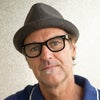
- Share on Facebook
- Share on Reddit
Don't miss a moment of the 2024 Tour de France! Get recaps, insights, and exclusive takes with Velo's daily newsletter. >","name":"in-content-cta","type":"link"}}'>Sign up today! .
“Don’t wear your heart on your sleeve, man!” the legendary Miles Davis used to tell his musicians with his trademark raspy voice. And while it is uncertain whether Belgian cycling legend Freddy Maertens is much of a jazzbo , it doesn’t really matter. He wouldn’t have listened to Miles anyway, because, well, Maertens has never been one to hide his emotions.
Maertens, who won 176 races in his career, is one of the sport’s most charismatic riders and one of its greatest champions. And he didn’t just win, he dominated. The fact that he was cooler than cool—be it in the classic Flandria kit that he donned much of his career, or the cool Colnago he rode later in his career—didn’t hurt much either.
And yet despite the undeniable success — he is one of the top-ten winningest cyclists in the history of the sport — Maertens also suffered humiliating defeat both on and off the bike. There were the 1973 world championships, where Italy’s Felice Gimondi, rode him into the barriers as the two approached the line. There was the crash in the closing kilometers of Paris-Roubaix in 1976. And of course, there was the infamous 1977 Tour of Flanders , where Maertens was apparently disqualified mid-race, yet allowed to continue to ride for second.
And then there were the long string of financial woes, often cited in the Belgian press, that have continued long after his career.
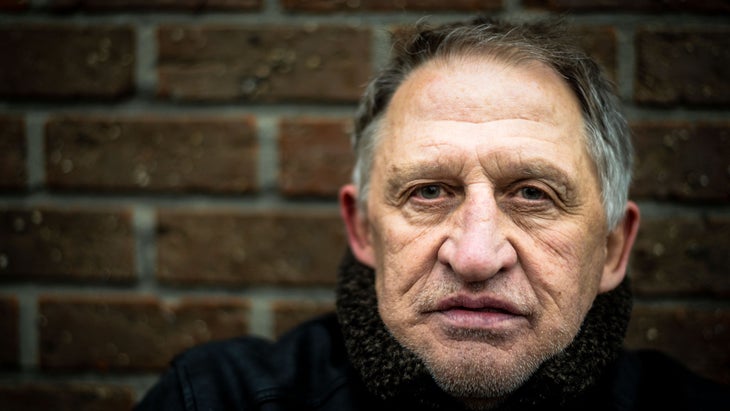
Yet through it all, Maertens’ gregarious laugh and easy smile, remain very much intact. Today, the 69-year-old Maertens lives modestly with his wife Carine in a small house on the edge of his native town of Roeselare where he could not be happier. His voracious laugh is never far, and he speaks easily of his long career, of his stunning victories and maddening defeats. “The only thing that I can say is that I did my best,” he told VeloNews during a quiet afternoon visit this past winter. “I am proud of that.”
Freddy Maertens is many things, but he is most certainly the greatest classics rider never to win one of the sport’s five monuments. A rapid-fire sprinter, who was also a feared time-trialer, Maertens was not unlike Wout Van Aert is today. His versatility twice earned him the world champion’s rainbow jersey, not to mention the green jersey in the Tour de France as well as victory in the Vuelta a España. But for a rider who undoubtedly possessed all of the ingredients to win any one of cycling’s five Monuments, victory in Ghent-Wevelgem was as close as he came.
Ghent-Wevelgem has been elevated to near-monument status, but back in Maertens’ day, it was a modest mid-week race, a sort of preparation for Paris-Roubaix. The true monuments, however, remained elusive for Maertens.
At times, victory seemed virtually assured, only to be swept away. There was the strange crash with the television motorcycle final of the 1976 Paris-Roubaix so brilliantly documented in Jorgen Leth’s legendary documentary film, A Sunday in Hell . “I was in the breakaway with my teammate Marc Demeyer. He was set to lead me out. But then suddenly this TV motorcycle came out of nowhere and took me down. Marc went on to win, but my chances were lost. It was like what happened with Julian Alaphilippe in the Tour of Flanders [in 2020].”
Italy’s Francesco Moser, who finished second that year and would go on to win Roubaix on three occasions, remembers, “We were all in the front group when he crashed,” Moser told VeloNews . “I didn’t actually see the crash. All I know is that if Freddy came into the velodrome with us, Freddy would have won. There was no question. He was the fastest.”
And finally of course there was the mysterious Tour of Flanders in 1977.
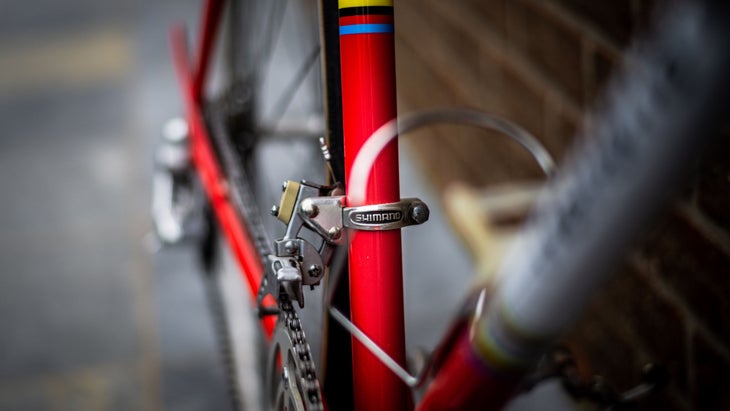
On that day, a race official reportedly told him mid-way through the race that he would be disqualified for an illegal bike change on the Koppenberg. Confused, he followed the orders of his team director Guillaume Dreissens, known for his mercenary approach to the sport, and stuck a deal with rival Roger De Vlaeminck. The deal, quickly arranged on the road, was for Maertens to keep pulling in the breakaway to assure that De Vlaeminck would win. According to Maertens, a financial agreement was struck for 300,000 Belgian francs. But it was not honored by De Vlaeminck. “He still owes me 150,000 Belgian francs!” Maertens says unabashedly.
“At the foot of the Koppenberg I changed bikes, like several riders, but apparently I did it 20 meters before it was allowed,” Maertens recalls of that strange day. “At least that is what the official said. But it was only 35-40 kilometers later in the race that the official came and said I was disqualified. Normally if you are disqualified you are expelled immediately. At that point, I had already had an impact on the race. At that point, I was already off the front with de Vlaeminck. I went back to my team director and asked what I should do. He told me to strike a deal with De Vlaeminck, so I did.”
Reviewing footage of that epic race, there is no announcement on television regarding disqualification, but it is obvious that Maertens is not riding to win. Driving the pace incessantly, he dropped Eddy Merckx and gave De Vlaeminck little occasion to even pull.
“I pulled for nearly 80 kilometers, knowing that I couldn’t win. At one point I actually thought about attacking Roger on the Muur van Geerardsbergen, but I held up my end of the bargain. And at the end of the day, Roger sprinted to victory. The worst was that just before the final kilometer of the race, the same official came to me and said, “Freddy, since you rode so well today, you can sprint for victory.” I was like “What? Are you crazy? I just pulled for 80 kilometers!”
At the finish De Vlaeminck rejoices at the line. In contrast, Maertens, head down, just keeps riding. There is no sign of protest, no sign of defeat, but simply resignation.
But while Maertens admits that he was frustrated never to win a Monument, other victories made up for such a void, especially his two world championship titles. And he is quick to qualify, “I certainly would not trade one of my world’s titles for a monument!”
If anything, Maertens is equally frustrated that he did manage to win the worlds already in 1973, a defeat he claims was a result of the budding rivalry between component manufacturers Shimano and Campagnolo. “That was the first year that Flandria rode Shimano, and before the start of the race, Campagnolo made it clear that they did not want Shimano rider winning. I’ll never forget. We were all out training on Thursday and the boss of Campagnolo came over to us and made it very clear, “Shimano may not win!”
According to Maertens, a series of events ensued during the race that only cemented such a scenario. “First Merckx attacked early, maybe 80 kilometers from the finish, and I was the only rider to bridge up to him. But as soon as he saw me there, he stopped riding. I didn’t understand because before the race I made it very clear that I would ride for Eddy. I told him. ‘I will be happy when you win and I finish second.’”
Complications continued in the final when Maertens found himself with Italian Felice Gimondi, Spaniard Luis Ocaña, and Merckx, all of who were racing on Campagnolo-equipped bikes. “First Merckx asked me to lead out the sprint, but Eddy couldn’t come around me. Then Gimondi rode me into the barriers. He clearly cut me off. But when I went to my team to complain and ask them to protest, they simply said, ‘No we cannot do that to our Italian friends.’ That’s not an answer! And it was incredibly frustrating at the time. But hey, I did win two times after that nevertheless!”
In fact, it was his second win in 1981 that Maertens insists is the most satisfying of his career. That year in Prague, many considered Maertens on the decline. And few considered him a real favorite. But he rode the race of his life to turn the tables on a mighty Italian team, not to mention his own Belgian squad.
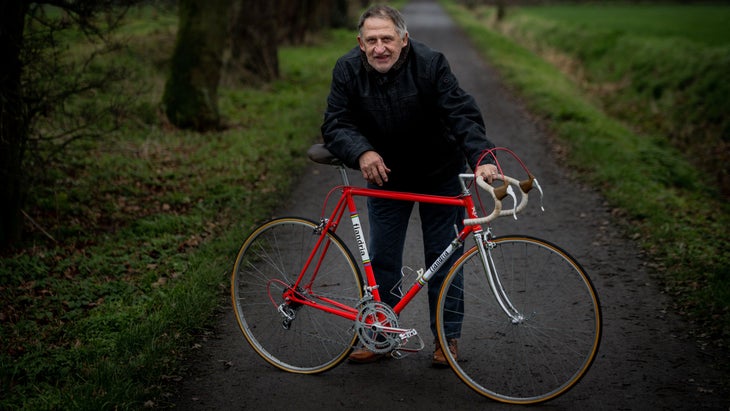
“Nobody thought I could win,” Maertens recalls. “I’ll never forget in the team meeting the night before they asked which riders thought they could win and I raised my hand. But when they asked who would ride for me, there was no one. But what can I say? For my entire career, Belgians were always riding against me.”
Maertens however, turned his attention to the Italian team and played off of them. “I had nine Italians on my side,” he says with a laugh. “We were a group of 21 riders in the front, with all of the Italians. I asked one of them what was their plan and he said that the team was riding for Giuseppe Saronni and Francesco Moser. They would defend Moser’s chances if he could get away, but in the final three laps it was all in for Saronni. So in the final three laps I just sat on Saronni’s wheel. At one point there were five Italians leading him out. And I was right behind him.”
While the 1981 world championship would be his most satisfying victory, it would also be his last significant one, and while he continued to race until 1987, he was only a shadow of his former self.
His career is long behind him, he continues to follow the sport. “I watch all of the races,” he says. “I love Van Aert, van der Poel and Pogačar also. And I love Peter Sagan. They all race with such panache, so aggressively. But sometimes I am not a big fan of Remco Evenepoel. I think he is getting way too cocky, saying where and when he will win. He even said in the Belgian press this winter that there would always be a place on his team for Wout van Aert, riding in support for him. That’s a bit much really. He said that this past winter in the Belgian press and it was really a bit over the top.” And then with a moment’s thought, he added. “You can’t be too confident in this sport.”
Popular on Velo
>", "path": "https://velo.outsideonline.com/road/road-racing/tour-de-france-femmes/they-really-want-to-win-the-tour-de-france-olympic-mtb-champ-pauline-ferrand-prevot-explains-visma-lease-a-bike-move/", "listing_type": "recirc", "location": "list", "title": "‘they really want to win the tour de france’: olympic mtb champ pauline ferrand-prévôt explains visma-lease a bike move"}}'> ‘they really want to win the tour de france’: olympic mtb champ pauline ferrand-prévôt explains visma-lease a bike move, >", "path": "https://velo.outsideonline.com/mountain/valuable-lessons-from-everyday-adventurers/", "listing_type": "recirc", "location": "list", "title": "valuable lessons from everyday adventurers"}}'> valuable lessons from everyday adventurers, >", "path": "https://velo.outsideonline.com/road/road-racing/tour-de-france-femmes/demi-vollering-tour-de-france-femmes-grand-depart-at-home-will-be-great/", "listing_type": "recirc", "location": "list", "title": "demi vollering: ‘tour de france femmes grand départ at home will be great’"}}'> demi vollering: ‘tour de france femmes grand départ at home will be great’, >", "path": "https://velo.outsideonline.com/mountain/mountain-racing/keegan-swenson-aims-to-shatter-his-own-leadville-record-this-time-with-drop-bars/", "listing_type": "recirc", "location": "list", "title": "keegan swenson aims to shatter his own leadville record—this time with drop bars"}}'> keegan swenson aims to shatter his own leadville record—this time with drop bars.
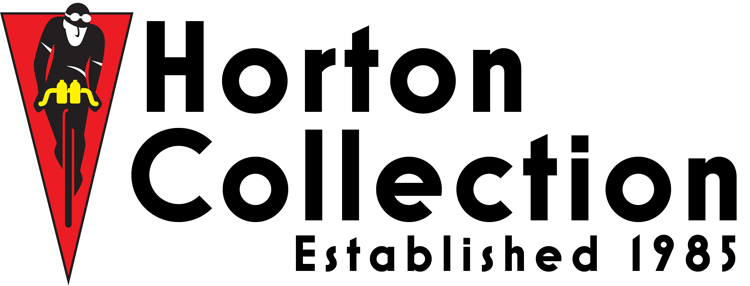
1976 Tour de France, Race Used Moto Plaque, Race Winner Lucien Van Impe
$ 180.00
1976 Tour de France, Race Winner Lucien Van Impe
The 1976 Tour de France was an exciting spectacle. Mountain specialist Lucien Van Impe won the race in a battle with the previous winners, Bernard Thevenet and Joop Zoetemelk. Zoetemelk won three high mountain stages, including Alpe d’Huez and Puy de Dome. But this Tour became widely known for the young Directeur Sportif of the Gitane-Campagnolo Team, Cyrille Guimard, who threatened to run Van Impe off the road with the Team Car if he didn’t attack. Feeling suddenly motivated, Van Impe attacked and won the Tour.
The revelation of the Tour, however, was Freddy Maertens, who, in his first Tour, won eight stages and the points classification and led the general classification for ten days.
Five-time winner Eddy Merckx did not join the 1976 Tour de France because he was injured. 1975 winner Bernard Thévenet left the race in the 19th stage, but at that point, it was already clear that Van Impe would win the race.
Joop Zoetmelk and Raymond Poulidor filled out the final podium in second and third overall. Giancarlo Bellini won the mountains classification with 170 points, only one point ahead of Lucien Van Impe. Enrique Martínez Heredia won the young rider classification. Heredia had already won the Tour de l’Avenir in 1974 but never broke through after this win.
In today’s racing, the race organizer cars, team vehicles, and other participants of the official race caravan have disposable stickers that are affixed to the windshield. Slipping a bit into the way back machine, there was a time when the cars had plaques attached to the front of the follow cars.
As with most things ephemeral, the majority of the plaques were promptly tossed in the trash once the race was finished. The ones that survived have become quite collectible.
Made of Plastic
Size: 8 x 8 inches (20 x 20 cm)
This is a one-of-a-kind item, so please look carefully at the photos to determine its condition.
Only 1 left in stock
Additional information
You may also like….
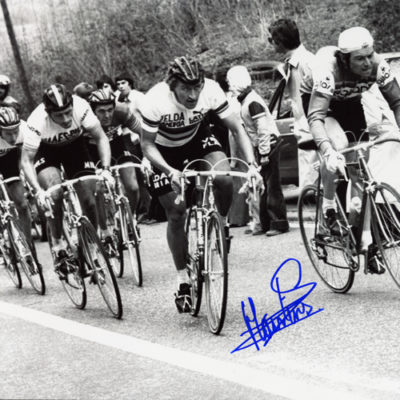
Freddy Maertens, 1976 & 1981 World Champion
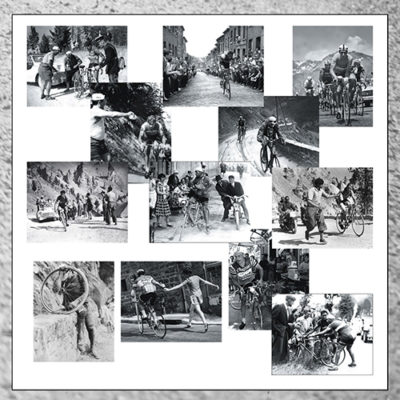
Tour de France , Set of 13, Vintage Cycling Prints
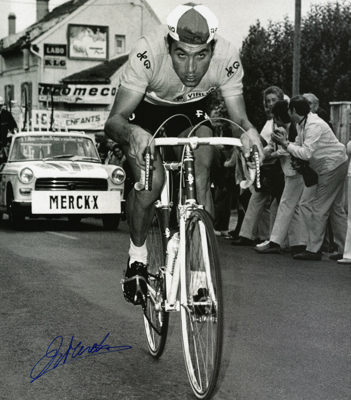
Eddy Merckx, 1970 Tour de France
Related products.
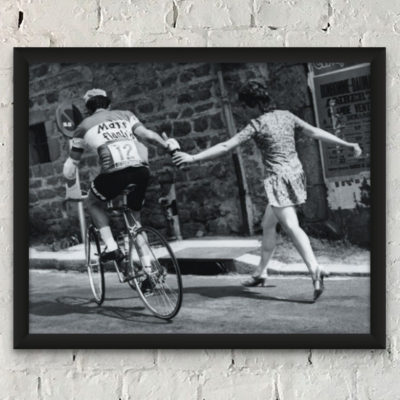
Roger De Vlaeminck, 1971 Tour de France
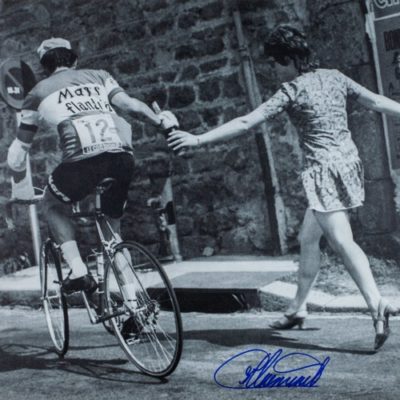
Roger De Vlaeminck, 1971 Tour de France, Limited Edition of 500
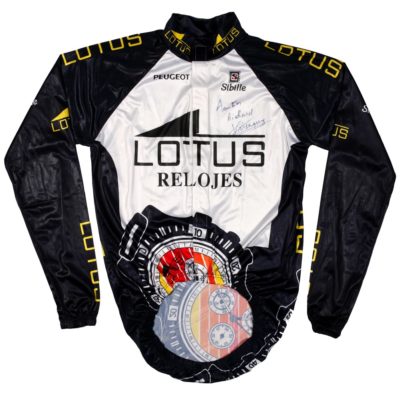
Richard Virenque, Signed Jersey Jacket
Recent comments.
- No categories
- Entries feed
- Comments feed
- WordPress.org

COMMENTS
The 1976 Tour de France was the 63rd edition of the Tour de France, one of cycling's Grand Tours. It took between 24 June and 18 July, with 22 stages covering a distance of 4,017 km (2,496 mi). ... Freddy Maertens - would follow his Tour performance by winning the 1976 World Championship, ...
Freddy Maertens is the winner of Tour de France 1976 Stage 1, before Régis Delépine and Ercole Gualazzini. Freddy Maertens was leader in GC. ... 1976 » 63rd Tour de France (SPP)
But the story doesn't end there, especially not for Freddy Maertens. In that same Tour, he would go on to win two more stages, bringing his total for that Tour to 8 stage victories. ... Out of the 60 regular stages in the Tour de France of 1976, the Vuelta a España of 1977, and the Giro d'Italia of 1977, the Belgian won 28. In all six Grand ...
Freddy Maertens often benefited by the help of his team-mates, Michel Pollentier and Marc Demeyer. They cleared a path through the bunch in the style of an earlier sprinter, Rik Van Looy. Journalists called them the Three Musketeers. In 1976 he won eight stages of the Tour de France. He won the points classification in 1976 and again in 1978 ...
Freddy Maertens win rit 3 Granville-Angers in deTour de France van 1976.Het was een zware Ronde met een hittegolf en dorstig weer.Freddy won 8 ritten en de g...
Freddy Maertens' name is inseparable from the Flandria legend. Maertens stayed at Flandria for most of his career, during which time he became the greatest winning machine cycling has ever seen. ... 1976 where he won Flandria's second professional road race title, and he also took a record-equalling 8 stages of the Tour de France, which ...
Freddy Maertens (born 1952-02-13 in Nieuwpoort) is a former professional road racing cyclist from Belgium, active between 1971 and 1987. His best results are 15 stage wins in Tour de France and 2 wins in World Championships ME - Road Race.
Freddy Maertens won 8 stages in the 1976 tour, equaling the record set by Charles Pélissier in 1930 and Merckx in 1970 and 1974. And Raymond Poulidor? The great man finished third, 12 minutes, 8 seconds behind winner van Impe. This was the fourteenth and final Tour de France for the 40-year old Poulidor.
It's too easy. Freddy Maertens looking out the Tour of Flanders museum's main window. There is a cobblestone for each winner. On top of De Vlaeminck's 1977 stone is one with Freddy Maertens' name and under the year it says "moral winner". Maertens discusses the 1977 Tour of Flanders near the end of the interview.
Jerseys of the 1976 Tour de France. Yellow jersey (winner of the Tour de France) : Lucien Van Impe in 116h22'23". Polka dot jersey (best climber) : Giancarlo Bellini with 170 points. Green jersey (best sprinter) : Freddy Maertens with 293 points. White jersey (best young rider) : Enrique Martínez Heredia in 117h07'13".
In addition, he took first place in the Giro d'Italia in 1978, the Vuelta a España in 1977, and the Tour de France twice in 1976 and 1978. Maertens' career was plagued by a number of setbacks and injuries, including a serious crash in the 1981 Tour de France that necessitated his withdrawal from the competition.
Freddy Maertens (BEL) (1976, in addition to four 2nd and two 3rd places) ... The youngest Tour de France stage winner is Fabio Battesini, who was 19 when he won stage 3 in the 1931 Tour de France. The oldest Tour de France stage winner is Pino Cerami, who won stage 9 of the 1963 edition at 41 years old.
By 1978 Maertens' star was beginning to wane, though he still had a very successful season by anyone else's standards, with victories in Omloop Het Volk, E3 Prijs Vlaanderen and the Four Days of Dunkirk, as well as stages of the Dauphine and the Tour de Suisse. When Maertens made his professional debut in 1973 he was a force of nature.
Freddy Maertens is the winner of Tour de France 1976 Prologue, before Jesús Manzaneque and Bernard Thévenet. Freddy Maertens was leader in GC. ... 1976 » 63rd Tour de France (SPP)
Freddy Maertens - Tour 1976 Le Touquet
Freddy Maertens fait partie des coureurs ayant remporté huit étapes au cours d'un même Tour de France. 1976 : 8 e, vainqueur du classement par points et de 8 étapes, porteur 9 jours du maillot jaune (dont une journée à deux demi-étapes) [31] 1978 : 13 e, vainqueur du classement par points et de 2 étapes
Route of the 1976 Tour de France. The 1976 Tour de France was the 63rd edition of the Tour de France, one of cycling's Grand Tours.The Tour began in Saint-Jean-de-Monts with a prologue individual time trial on 24 June, and Stage 13 occurred on 9 July with a mountainous stage from Font-Romeu-Odeillo-Via.The race finished in Paris on 18 July.
Competing teams and riders for Tour de France 1976. Top competitors are Freddy Maertens, Freddy Maertens and Freddy Maertens. ... 1976 » 63rd Tour de France (SPP)
With 30 Tours de France under his belt, James Startt is the senior American journalist in the pressroom of the Tour and author of Tour de France/Tour de Force, the first English history of the great French race. James focuses on the human element, telling the stories of the many people behind the scenes as well as the world's best riders.
The 1976 Tour de France was the 63rd edition of the Tour de France, one of cycling's Grand Tours. The Tour began in Saint-Jean-de-Monts with a prologue individual time trial on 24 June, and Stage 12 occurred on 8 July with a mountainous stage to Pyrénées 2000 [ fr]. The race finished in Paris on 18 July.
The revelation of the Tour, however, was Freddy Maertens, who, in his first Tour, won eight stages and the points classification and led the general classification for ten days. Five-time winner Eddy Merckx did not join the 1976 Tour de France because he was injured. 1975 winner Bernard Thévenet left the race in the 19th stage, but at that ...
Before the start of the Tour de France, the organization declares which stages are considered "flat", "medium mountain" or "high mountain". ... Freddy Maertens 1976 (27 stages) Some riders wore the jersey in some stages as second in points classification (because the leader wore yellow jersey) and led all other stages: Freddy Maertens 1978 ...